Judge Craig Mitchell
The Superior Court Judge transforming lives on Skid Row
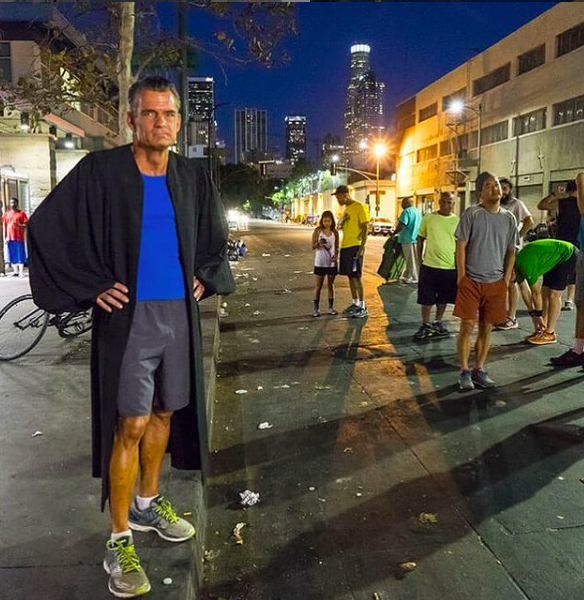
"The person sleeping on the sidewalk still has potential”

The Honourable Judge Craig Mitchell is no ordinary judge.
Almost a decade ago, he founded the Skid Row Running Club to support individuals recovering from alcohol and drug addiction on the streets of Skid Row, Los Angeles.
Since then, he has led three weekly training sessions around Downtown Los Angeles, including six-mile runs on Mondays and Thursdays, and up to 18-miles on Saturdays.
“I’m not a great runner”, Judge Mitchell confessed.
“But the crucial thing is my willingness to devote time to this enterprise.”
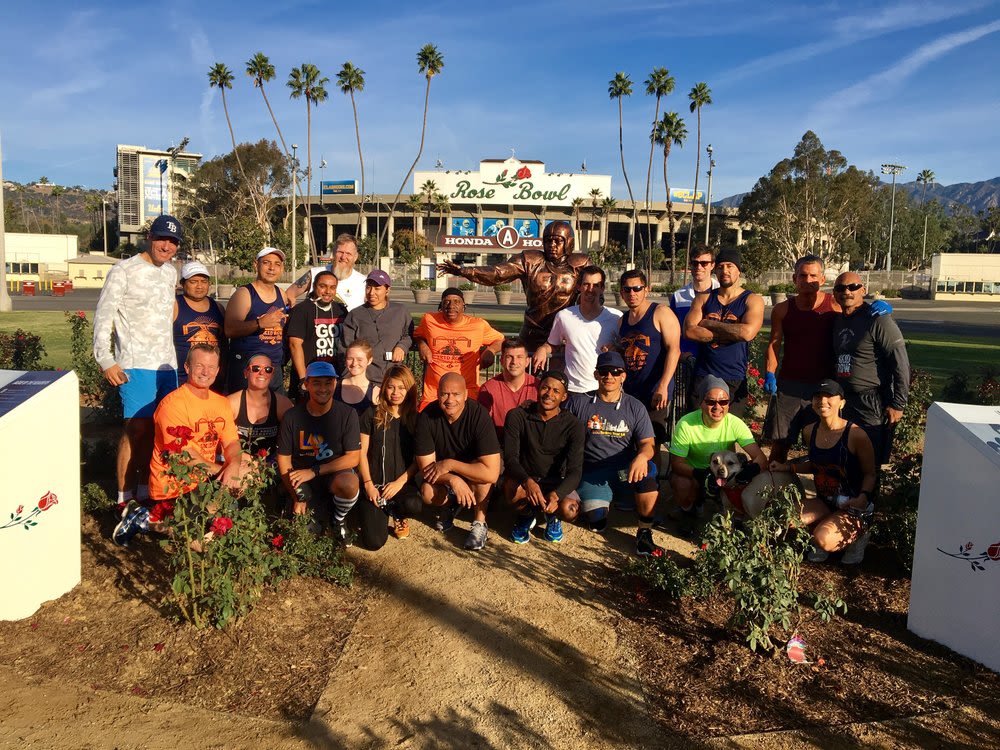



On Mondays and Wednesdays, Judge Mitchell wakes up at 2.30am in time for the early morning club run.
“I don’t enjoy getting up at that time but I do it because the people in the program deserve it”, he said.
The club was founded in 2012 when Judge Mitchell was reintroduced to a man he previously convicted, only years before. Roderick Brown was on parole when he visited Judge Mitchell in his Los Angeles courtroom, and encouraged him to visit the charity, The Midnight Mission on Skid Row.
“For some reason, he liked the way that I treated him even though I sent him to prison”, Judge Mitchell recalled.
“He wanted me to meet the people involved in his recovery.”
Judge Mitchell visited The Midnight Mission, a non-profit organisation in the heart of Downtown Los Angeles, which has provided recovery services to inhabitants of Skid Row since 1914.
The judge met Larry Adamson, the president at the time, who encouraged him to get involved in one of their programs.
“I knew how essential running was to my own health and well-being and I thought it would make a lot of sense to share that with people in recovery”, Judge Mitchell recalled.
“And that was the beginning of the Skid Row Running Club.”
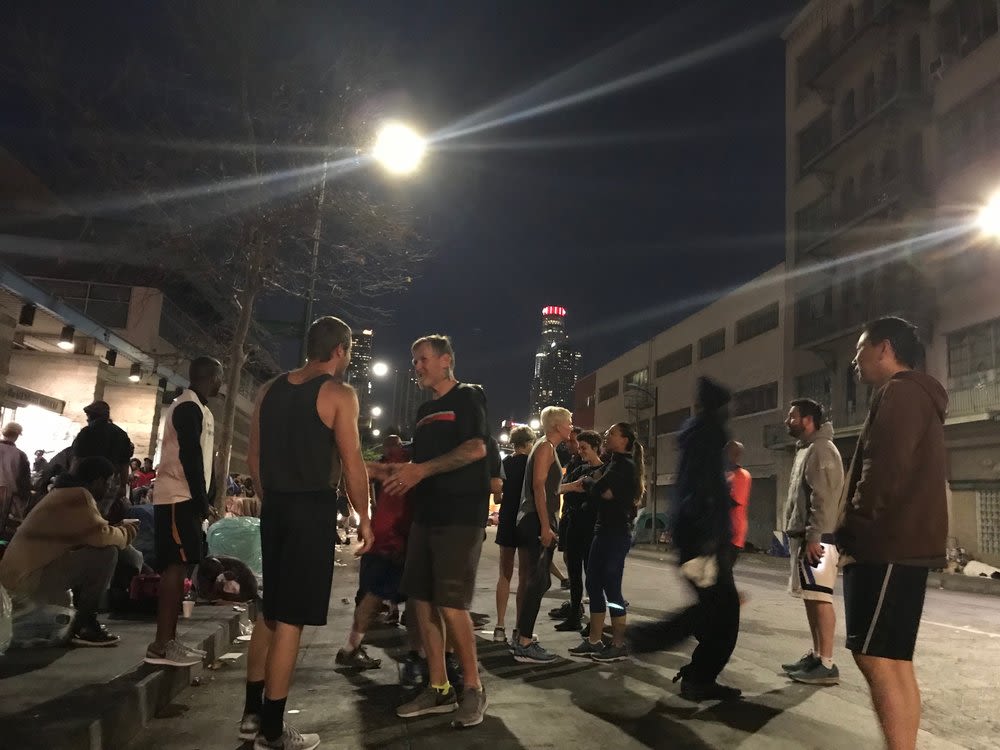


The Midnight Mission on Skid Row, Los Angeles. Footage credit: Nick Johnson
The Midnight Mission on Skid Row, Los Angeles. Footage credit: Nick Johnson
Over the next nine years, the club expanded from two participants to around fifty regular runners.
Today, around a third of members are comprised of lawyers, college professors, mental health workers, and even ten Los Angeles Police Department (LAPD) officers who act as mentors and have provided employment opportunities to those from the Skid Row community.
“They talk about things being great equalizers”, Judge Mitchell said.
“Well, running belongs in that category.”
“If you’re running a marathon, it’s about getting to the finish line and the other details of your life don’t matter.”
It is this community which Judge Mitchell believes is the key to facilitating a successful recovery.
“You are interacting with people who care about you three times a week and if you relapse, you are going to devastate a lot of people.” he said.
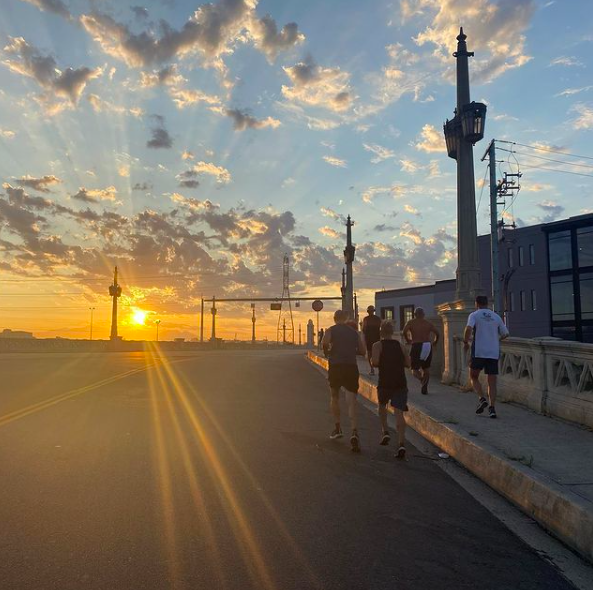
In recent years, the club has expanded well beyond the confines of the thrice weekly runs as Judge Mitchell led a team of runners to compete in marathons abroad including Ghana, Italy and Vietnam. For some of these runners, the organised trips are their very first visits abroad.
This is all part of Judge Mitchell’s larger plan to instil a sense of self-worth in his runners.
“The running is secondary”, he admitted.
“It’s a mechanism by which we get to interact.”
To Judge Mitchell’s delight, these interactions are no longer limited to club sessions.
“The Judge”, as he is known on Skid Row, enjoys a lunchtime run between court sessions and can often be found wearing running kit and trainers under his black robe.
Recently, he was joined on three lunchtime runs in one week, by club runners seeking some one-on-one time.
“They want my undivided attention”, he laughed. “It’s wonderful that the courthouse is a 10-minute walk from Skid Row which makes it all possible.”
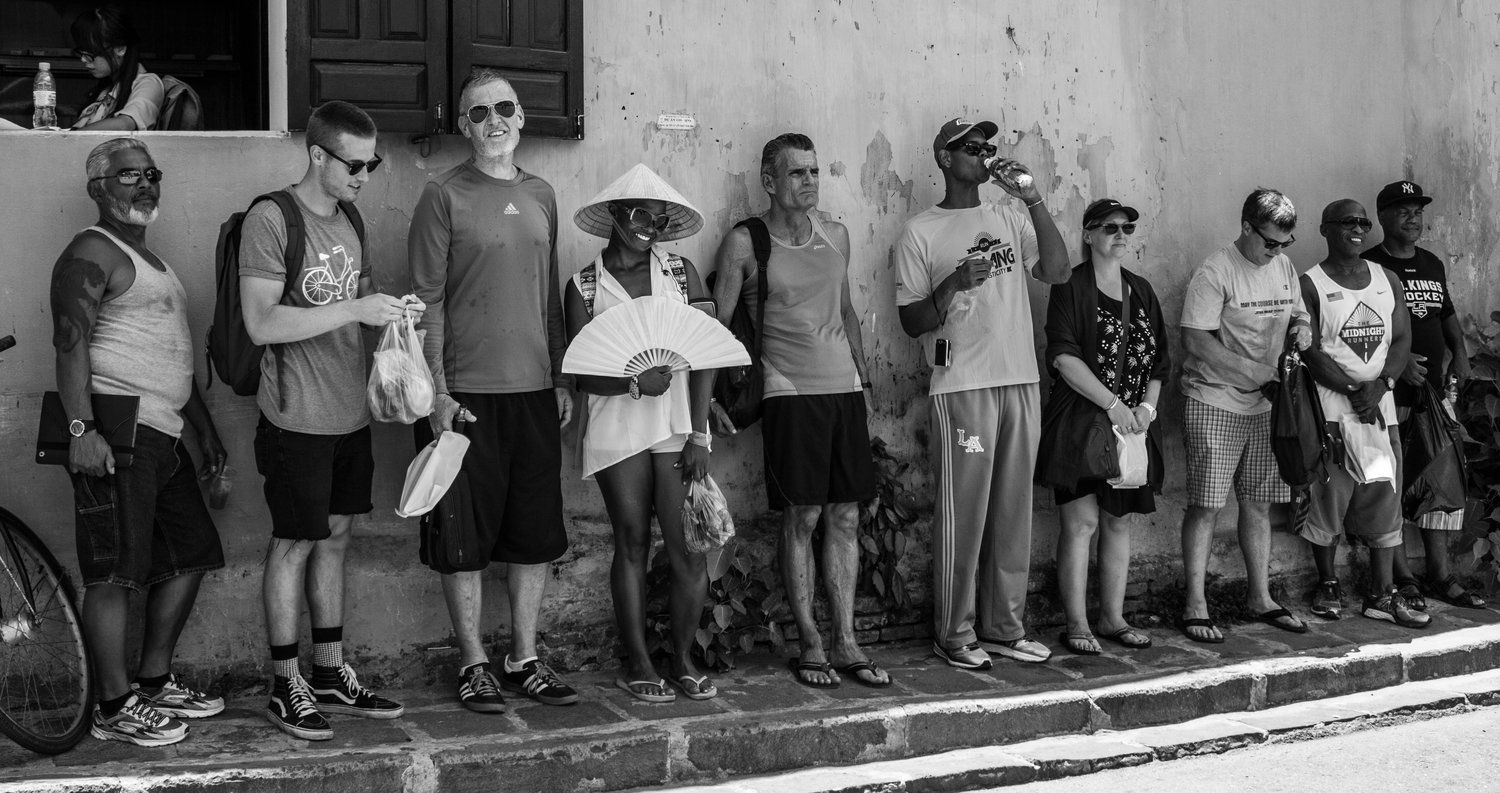
Despite earlier ambitions of going into the priesthood, Judge Mitchell pursued a career in public schooling in his 20s, and spent almost two decades nurturing students from inner-city Los Angeles.
“I loved the relationships between the students and myself, equipping young people to succeed at the college level”, he said.
After completing a law degree, Judge Mitchell served as a prosecutor before applying for a judicial appointment, recognising the ability of a judge to implement fairness and justice in the criminal justice system.
In 2005, he was appointed to the Los Angeles County Superior Court bench by Governor Arnold Schwarzenegger, and has since prosecuted more murder cases than any other prosecutor in Los Angeles.
But Judge Mitchell’s latest adventure with the Skid Row Running Club, is one he could not have predicted.
“If you’d asked me ten years ago that this would be the most recent chapter in my life, I’d have been absolutely clueless”, he laughed.
When asked whether he makes the most impact in the courtroom or on Skid Row, Judge Mitchell does not hestitate to answer.
“That’s easy”, he stated. “It’s what I do on Skid Row.”
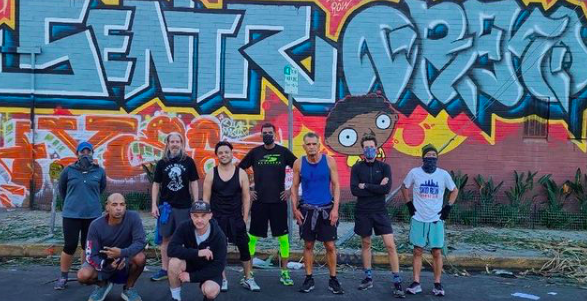


Judge Mitchell has witnessed countless lives transformed because of the club, with members becoming employed, getting married, having families and getting their lives back on track.
He tells the story of Brian, just one of many names who he could mention, who was born with learning difficulties due to his mother’s crack cocaine addiction while she was pregnant with her son.
Brian eventually found himself on Skid Row where he later met Judge Mitchell and joined the Skid Row Running Club.
Brian’s aptitude for IT became increasingly apparent and he was encouraged to enrol in a local community college and eventually secured the role as Head of IT Support at LA Tourism.
“This is a kid who didn’t graduate from high school”, Judge exclaimed. “He’s an absolute wizard in this area.”
Like Brian, many of the people who Judge Mitchell meets on Skid Row have encountered homelessness and addiction problems because of the crack cocaine epidemic of the 1970s and 1980s.
“We are seeing the result of generational dysfunction in a lot of families and the result of not raising children in a wholesome environment”, Judge Mitchell observed.
“When you lack parental guidance and support, life spins out of control very quickly and the road to addiction is much easier to access”, he continued.
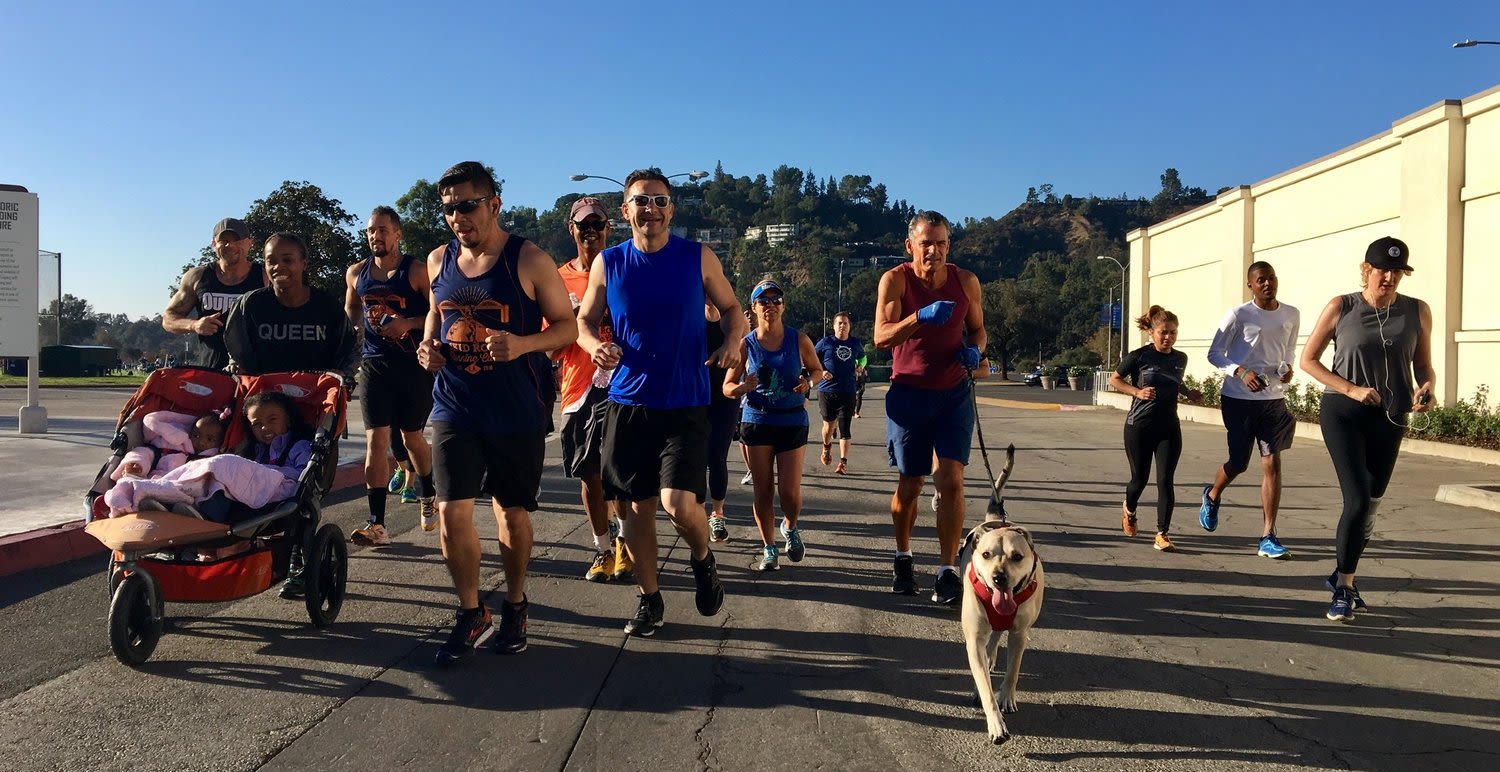


For Judge Mitchell, who was validated by his parents and teachers growing up, he believes it is his role to encourage and affirm those living on the streets of Skid Row.
He takes every opportunity to build community and foster relationships with his club members, from sharing sandwiches together after the long Saturday run, to celebrating the Fourth of July at his annual summer bbq.
Earlier this month, running club members competed in a 54-mile ultra-marathon along the Los Angeles River, before staying overnight at a local hotel.
Ahead of the race, Judge Mitchell revealed his excitement that the event would “bring us just that much closer.”
Next year will mark the Skid Row Running Club’s tenth anniversary, but it seems the club is just getting started.
Thanks to funds raised by The Midnight Mission and attention drawn by the 2017 documentary Skid Row Marathon, club runners can continue partaking in marathons around the globe.
In January 2022, 57 runners from the club will compete in the Egyptian Marathon.
The documentary, which aired worldwide, told the story of four individuals whose lives were turned around by the running club which led to huge financial support from around the world, and even drew international visitors to join running sessions on Skid Row.
“Skid Row Marathon was a game changer”, Judge Mitchell exclaimed.
“The running community in England responded incredibly well to the movie so financially, we are able to do the type of things that we do because of the movie”, the judge revealed.
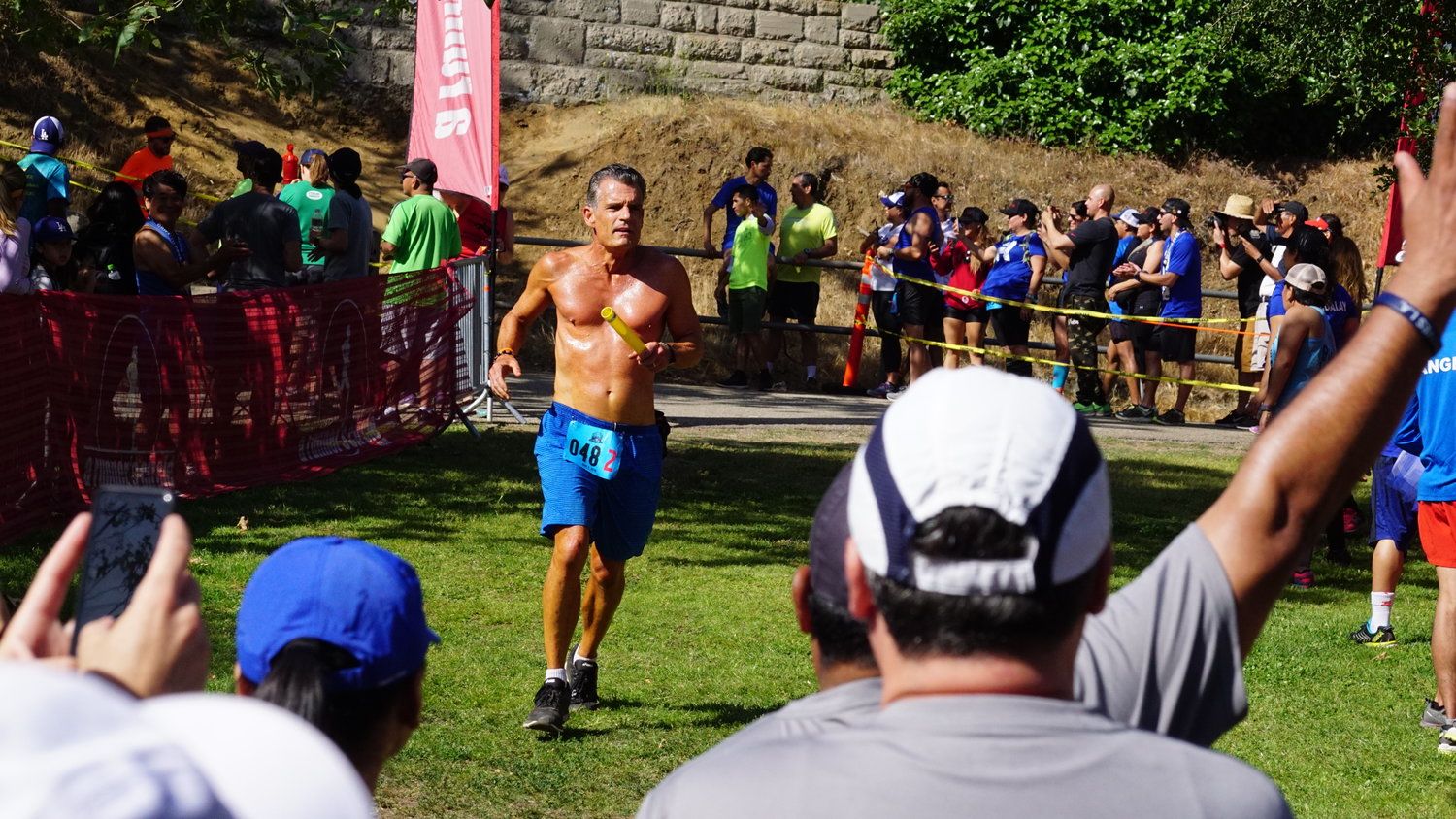


Whilst the running club has transformed hundreds of lives, Judge Mitchell recognises it is not the solution for all 2,500 unhoused individuals living on Skid Row.
“The club is populated by those at that unique point in their lives when they want to seriously address their addiction issues, but the vast majority of people on Skid Row are not at that point”, he lamented.
“It’s painful but it’s reality.”
Despite the challenges, Judge Mitchell remains as ever committed to his mission of nurturing and encouraging those who most need it on the city’s streets.
“Underneath that person who is dirty and sleeping on the sidewalk with matted hair, is a person who still has potential”, he said. “And we can revive it.”
He concluded: “I think that’s one of the most worthwhile human endeavours we can be involved in.”
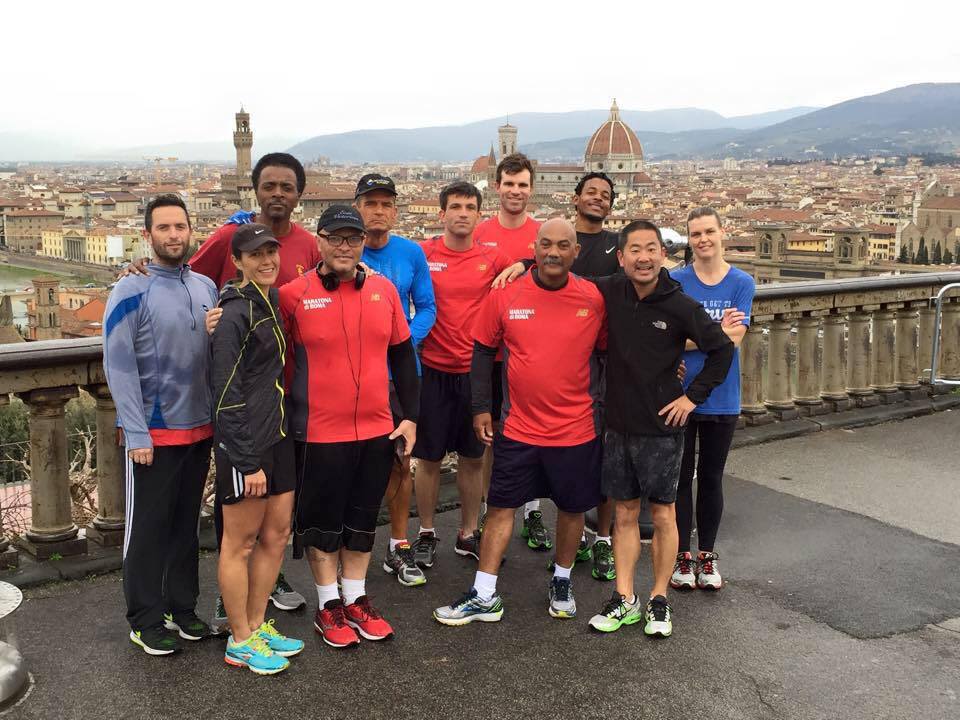


You can donate to the Skid Row Running Club at skidrowrunningclub.com.
You can also watch the award-winning documentary Skid Row Marathon on Amazon Prime, Apple TV or Vimeo.

